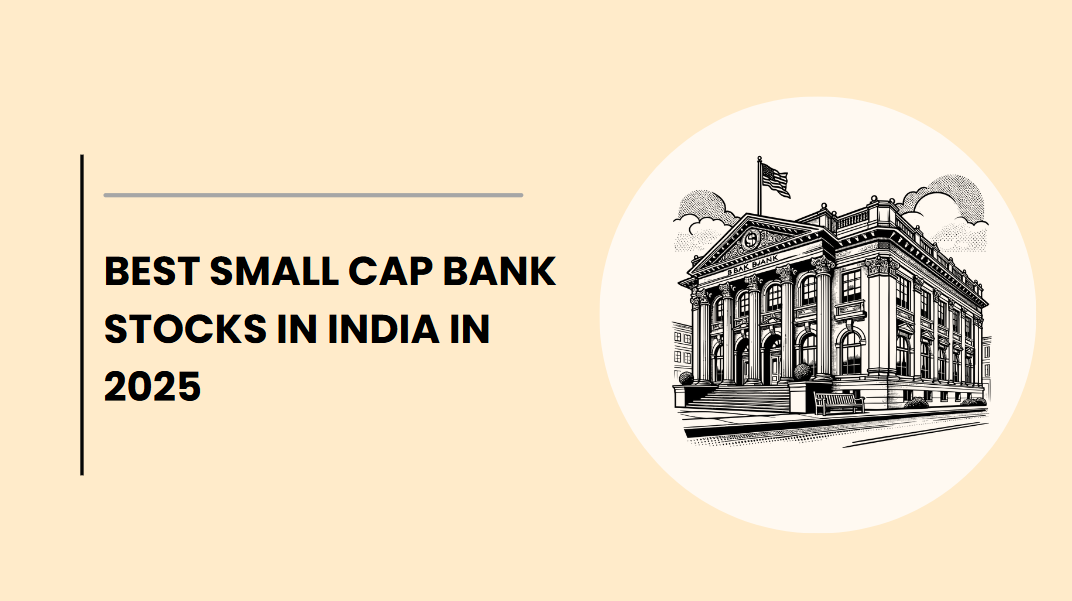What Are Small Cap Banks?
Small cap banks are financial institutions with a relatively small market capitalization compared to large and mid-cap banks. These banks typically focus on specialized markets such as rural and semi-urban regions, extending services to underserved sectors like small businesses, micro industries, and low-income households.
Notable examples of small cap banks in India include Ujjivan Small Finance Bank, AU Small Finance Bank, and Equitas Small Finance Bank. Small cap banks are attractive to investors due to their potential for rapid growth and financial inclusion efforts. However, they also come with higher risks, such as limited liquidity and exposure to asset quality issues, requiring careful consideration before investment.
Top 10 Small Cap Bank Stocks in India
Here are the Top 10 Small Cap Bank Stocks in India
1. Dhanlaxmi Bank Ltd
Founded: 1927
Headquarters: Thrissur, Kerala
Dhanlaxmi Bank has established a strong footprint in southern India. With over 560 customer touchpoints by March 31, 2024, it operates 261 branches, 282 ATMs, and 17 business correspondents. Around 58% of the bank’s branches are located in Kerala, with the remainder spread across Tamil Nadu, Maharashtra, Karnataka, and other states.
Services:
- Retail and corporate banking
- Personal loans, MSME financing, and agricultural loans
- Treasury operations
Investment Potential:
The bank’s regional strength and expansion strategies offer growth prospects, but it faces challenges like asset quality issues and limited capital infusion.
2. Capital Small Finance Bank Ltd
Founded: 2016 (Converted from Capital Local Area Bank)
Headquarters: Jalandhar, Punjab
Capital Small Finance Bank is known for offering a variety of financial products across asset and liability portfolios. It provides services like home loans, MSME loans, trading loans, and agricultural credit, focusing on rural and semi-urban segments.
Specialization:
- Mortgages and housing loans
- Working capital loans for small businesses
- Agriculture and farm credit
Growth Insight:
The bank’s deep focus on small businesses makes it a preferred choice in northern India. However, its reliance on niche markets could pose risks if economic challenges affect these regions.
3. Suryoday Small Finance Bank Ltd
Founded: 2008 (Became SFB in 2017)
Headquarters: Navi Mumbai, Maharashtra
Suryoday Small Finance Bank initially started as an NBFC and transitioned into a Small Finance Bank in 2017. The bank primarily caters to underbanked and unbanked segments, focusing on financial inclusion.
Key Offerings:
- Microloans and personal loans
- Affordable housing finance
- Savings and deposit products tailored for low-income customers
Investment Potential:
Its focus on microfinance and unbanked populations offers significant growth prospects. However, the bank is vulnerable to regulatory changes and credit risks inherent in microfinance operations
4. ESAF Small Finance Bank Ltd
Founded: 1992
Headquarters: Thrissur, Kerala
ESAF Small Finance Bank focuses on lending to individuals and small enterprises in rural and semi-urban areas. The bank has been a pioneer in promoting social impact banking, focusing on women’s empowerment and environmental sustainability.
Notable Products:
- Microloans and self-help group loans
- Green loans for sustainable initiatives
- Savings schemes for low-income groups
Growth Prospects:
ESAF’s social focus and rural penetration provide growth potential, but it faces challenges related to maintaining profitability and managing non-performing assets (NPAs).
5. Fino Payments Bank Ltd
Founded: 2006
Headquarters: Mumbai, Maharashtra
Fino Payments Bank is a fintech-driven institution that focuses primarily on digital payment solutions. The bank offers a wide range of products, including savings accounts, remittance services, and utility bill payments, with a strong presence in rural India.
Services:
- Digital savings and current accounts
- Remittance and micro-ATM services
- Utility bill payments and insurance distribution
Investment Perspective:
The bank’s innovative approach to digital payments makes it a promising investment. However, it faces stiff competition from other fintech companies and traditional banks.
6. DCB Bank Ltd
Founded: 1995
Headquarters: Mumbai, Maharashtra
DCB Bank evolved from the Development Co-operative Bank Ltd and has grown into a commercial bank focusing on retail, SME, and corporate banking services. The bank serves both urban and semi-urban customers with various loan products.
Key Services:
- Home loans, gold loans, and vehicle loans
- SME financing and agri-business loans
- Treasury and forex services
Growth Outlook:
DCB Bank’s diversified portfolio provides stability. However, it needs to improve operational efficiency to compete with larger private banks.
7. Utkarsh Small Finance Bank Ltd
Founded: 2009
Headquarters: Varanasi, Uttar Pradesh
Utkarsh Small Finance Bank primarily follows the joint liability group (JLG) model, offering small, collateral-free loans to economically active women. The bank has diversified its portfolio in recent years to include affordable housing and MSME loans.
Products:
- Microfinance loans to women
- MSME and affordable housing loans
- Savings and recurring deposit accounts
Investment Insight:
Utkarsh’s focus on microfinance and underserved markets presents growth opportunities, but it is vulnerable to credit risks and defaults.
8. CSB Bank Ltd
Founded: 1920 (as The Catholic Syrian Bank Ltd)
Headquarters: Thrissur, Kerala
CSB Bank is one of the oldest private sector banks in India, with a strong base in Kerala. The bank specializes in serving SMEs, retail customers, and NRIs with a range of banking products.
Key Offerings:
- SME loans and gold loans
- Retail savings and current accounts
- NRI banking services
Growth Potential:
The bank’s long-standing reputation and niche focus provide stability, but it faces challenges in expanding beyond its traditional market.
9. Jana Small Finance Bank Ltd
Founded: 2006
Headquarters: Bengaluru, Karnataka
Jana Small Finance Bank evolved from an NBFC and provides financial services to small and medium-sized enterprises (SMEs). Its product portfolio includes MSME loans, gold loans, affordable housing finance, and vehicle loans.
Notable Services:
- Term loans to NBFCs and MSMEs
- Two-wheeler and gold loans
- Loans secured by fixed deposits
Investment Outlook:
Jana Bank’s focus on SME lending positions it well for growth, but it must manage asset quality issues effectively to sustain its progress.
10. South Indian Bank Ltd
Founded: 1929
Headquarters: Thrissur, Kerala
South Indian Bank was the first scheduled bank in Kerala’s private banking sector. It provides a comprehensive range of banking services, including corporate, retail, and treasury operations.
Services:
- Corporate and retail loans
- Foreign exchange and treasury operations
- Third-party product distribution (insurance and mutual funds)
Growth Insight:
South Indian Bank’s regional dominance offers growth potential, but it faces stiff competition from other private and public sector banks.
Read More: Top Indian Infrastructure Stocks to Watch in 2024
Benefits of Investing in Small Cap Banks
- Growth Potential: Small cap banks target niche markets with significant expansion opportunities.
- Higher Returns: Their smaller size and focus on financial inclusion often result in faster growth and higher returns.
- Economic Development: Investments in these banks contribute to rural development and financial inclusion.
Risks of Investing in Small Cap Banks
- Liquidity Issues: These banks have limited access to capital, making them vulnerable to financial shocks.
- Volatility: Small cap stocks are prone to price fluctuations, leading to higher risks.
- Regulatory Challenges: Policy changes can have a significant impact on these banks’ operations.
Conclusion
Investing in small cap banks offers promising growth opportunities and supports financial inclusion. However, these investments carry risks related to liquidity, asset quality, and market volatility.
Investors should conduct thorough research and diversify their portfolios to mitigate risks and enhance long-term returns. Assessing one’s risk tolerance and aligning investments with financial goals are essential steps for success in this segment.











